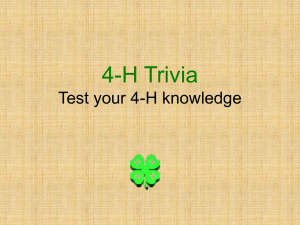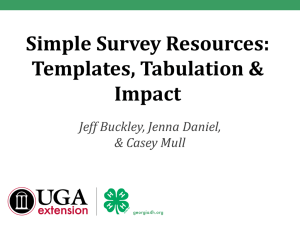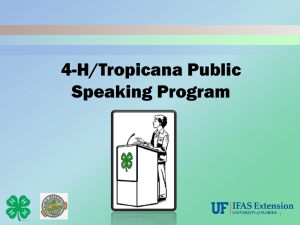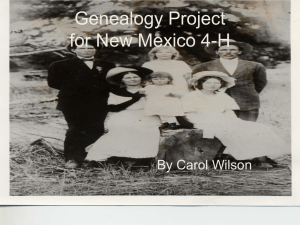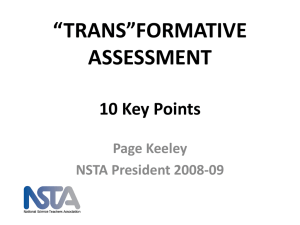Science Fair Project - Gaston County Center
advertisement
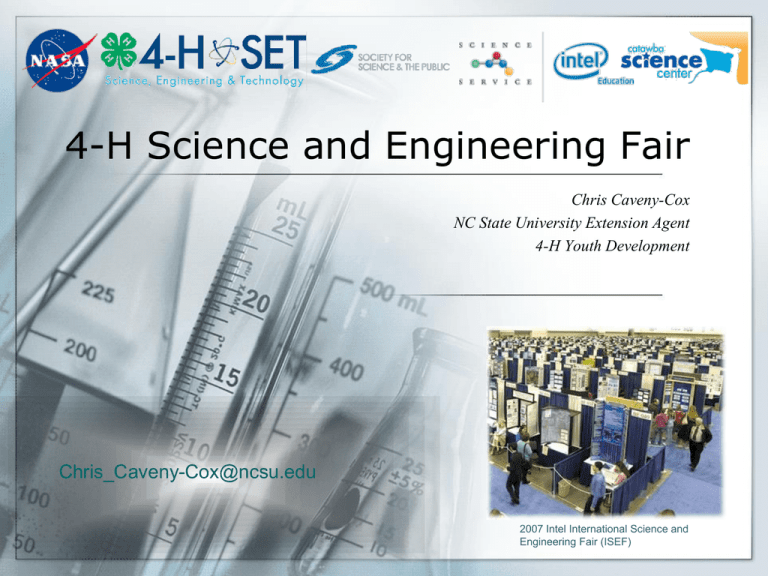
4-H Science and Engineering Fair Chris Caveny-Cox NC State University Extension Agent 4-H Youth Development Chris_Caveny-Cox@ncsu.edu 2007 Intel International Science and Engineering Fair (ISEF) Defined Need • Connecting academics to the real world • Cross curriculum opportunities • Fostering in students an interest in science and engineering • Development of critical thinking life skills • Applied experiential learning • Newly implemented state science testing requirements • Research backed emphasis on experiential and inquiry based instructional models • Workforce development and STEM related Pathways exposure • Support of North Carolina and National Standard Course of Study across educational disciplines • Lack of Scientists a National Concern So What’s all the Concern 2005 in North Carolina… 64% of 4th and 56% of 8th grade students received science assessment scores above basic 24% of 4th and 27% of 8th grade students received science assessment scores above proficient (source: National Assessment of Educational Process). 2% of 4th and 3% of 8th grade students received science assessment scores above advanced 2009 in North Carolina… Official Results to be released this Summer. Preliminary panel results suggest a decline in performance. Source: National Assessment of Educational Progress (NAEP) 21st Century Skills • Learning & Thinking Skills • Critical Thinking • Problem Solving • Creativity & Innovation Skills • Collaboration Skills • Information Skills • Information & Media Literacy Skills • Contextual Leaning Skills I should do a project, why? - District, Region, State, National, and International Competition opportunities - Scholarships - Opportunity to network - Learn something new - Experiment with possible occupations - Travel - Money - Portfolio building opportunity - Expand on current work - An opportunity to DO science What’s It Look Like Anyway The Science Fair Alaska Science Fair Church Hill Middle School Science Fair Putting it Together The Competitive Experience Competitive Connections Project Record Presentations 4-H District Science and Engineering Fair Regional Student Academy of Science (4HSEF) School Grade NC Region Science and Engineering Fair Junior Science and Humanities Symposia (HSHS) NC Student Academy of Science International Science and Engineering Fair (ISEF) NC State Science and Engineering Fair (NCSEF) National Middle School SSP Science Fair International Sustainable World (Energy, Engineering and Environment) Project Olympiad (ISWEEEP) Dotting Your “i’s” and Crossing Your “t’s” 1. Display 2. Log Book 3. Report w/ Bibliography High School Middle School Competitive Categories and Age Groups 1 LIFE SCIENCE 2 EARTH SCIENCE 3 PHYSICAL SCIENCE 4 TECHNOLOGY & ENGINEERING Junior – Late Elementary and Middle School (ages 9 to 13) Senior – High School (ages 14 to 19) Awards $$$ 1st Place Each Age Group Each Category $$$ 2nd Place Each Age Group Each Category $$ 3rd Place Each Age Group Each Category $$$ Overall Fair Champion $$ Overall Honorable Mention $$ Overall Honorable Mention Affiliated with the North Carolina Science and Engineering Fair system Teams can be made up of no more than three individuals. Team winners must split awards equally amongst the members. Teams compete in the oldest member’s age category. Dotting Your “i’s” and Crossing Your “t’s” - Continued Getting Entered… Elementary and Middle School (Ages 9 – 13) Elementary and Middle School Form You must have an Adult Sponsor to oversee your project!!! High School (Ages 14 – 19) $5 Entry Fee 1 – Checklist for Adult Sponsor / Safety Assessment 1A – Student Checklist / Research Plan 4-H 1B – Approval Membership 1C – Regulated Research Institutional / Industrial Setting Forms 2 – Qualified Scientist 3 – Risk Assessment 4 – Human Subjects and Informed Consent ISEF Forms 5 – Vertebrate Animal 6A – Potentially hazardous Biological Agents ISEF Rules Wizard 6B – Human and Vertebrate Animal Tissue 7 – Continuation Projects Projects - Learn by Doing 1. Break up into teams of two to three. 2. Choose one of five experiments sheets 3. Collect Supplies as per experiment sheet 4. Perform the experiment 5. Collect the data 6. Analyze the data 7. Present your results Discussion Example Presentation (A Study) Example Presentation (An Innovation) Example Presentation (An Experiment) Support / Resources Cyber Fair: Steps to Prepare a Science Fair Project (http://www.isd77.k12.mn.us/resources/cf/steps.html) Discovery Channel School: Science Fair Central (http://school.discovery.com/sciencefaircentral/) Experimental Science Projects: An Introductory Level Guide (http://www.isd77.k12.mn.us/resources/cf/SciProjIntro.html) Gateway to Educational Materials: Science Fair projects (http://members.ozemail.com.au/~macinnis/scifun/projects.htm) Science Buddies (http://www.sciencebuddies.com/) Science Fair Primer (http://users.rcn.com/tedrowan/primer.html) Science Fair Project on the Web:Step by step instructions (http://sciencefairproject.virtualave.net/observation.htm) The Ultimate Science Fair Resource (http://www.scifair.org/) NSTA Science Resources for Teachers (http://science.nsta.org/enewsletter/200606/news_stories_high.htm) Internet Public Library (http://www.ipl.org/youth/projectguide/) Virtual Library – Science Fairs (http://physics.usc.edu/~gould/ScienceFairs/) Super Science Fair Projects (http://www.super-science-fair-projects.com/) Support / Resources - Continued Daab, Marcia. Science Fair Workshop – A Step by Step Guide for Preparing a Scienc Fair Project. Fearon Teacher Aids – Simon and Shuster Supplementary Education Group. Fredericks, Anthony and Asimov, Isaac. The Complete Science Fair Handbook (Grades 4 – 8). A Good Year Book, Department of GYB, 1900 East Lake Avenue, Glenview IL 60025. Funk, James. Learning and Assessing Science Process Skills. (Available from the NSTA Publications Catalog (800) 830-3232 or www.NSTA.org <http://www.nsta.org/> ) Ostlund, Karen. Science Process Skills, Assessing Hands-on Student Performance. Addison-Wesley Publishing Company, California, 1992. (Available from the NSTA Publications Catalog (800) 830-3232 or www.NSTA.org <http://www.nsta.org/> ) Ramig, Joyce, M.Ed., Bailer, Jill, M.Ed., Ramsey, John, Ph.D. Teaching Science Process Skills. Good Apple Science Resource Book (Grades 6 – 8), 1995. (Available from the NSTA Publications Catalog (800) 830-3232 or www.NSTA.org <http://www.nsta.org/> ) Rezba, Richard. Learning and Assessing Science Process Skills. Constance Sprague, Ronald Fiel, and James Funk, Kendall Hunt Publishers. Van Deman, Barry, and MocDonald, Edward, Nuts and Bolts – A Matter of Fact Guide to STEM fair projects. The Science Man Press – A division of TSM Marketing, Inc., 4738 N. Harlem Ave. Harwood Heights, IL 60656. Vriesenga, Daryl. Science Fair projects – a Practical Guide for Developing Science Projects. (Grades 4 – 6). Instructional Fair Inc., USA, 1990. Support / Resources - Continued • Mentors / Local Professionals in the discipline of the project • Parents • Teachers • Local Colleges and Universities • County 4-H Agents (can help you make resource connections to support your project) 4-H Science and Engineering Fair Leadership Committee Erin Graves – Education Coordinator, Catawba Science Center Linda Yoder - Science Instructional Specialist, Lincoln County Schools ?? - Science Instructional Specialist, Catawba County Schools Donna Mull - Extension Agent, 4-H Youth Development, Catawba County April Dillon – Extension Agent, 4-H Youth Development, Lincoln County Fran Senters – Extension Program Assistant, 4-H Youth Development, Lincoln County Ashley Lee – Extension Agent, 4-H Youth Development, Cleveland County Cynthia Robins – Extension Agent, 4-H Youth Development, Rutherford County Chris Caveny-Cox – Extension Agent, 4-H Youth Development, Gaston County Craig Wyant – President and CEO, A Fine Line Design Judy West - Extension Agent, 4-H Youth Development, Wilkes County Teri Baltzegar– Regional Homeschool Liaison Mark Your Calendar… 21 June 2010 – Science Fair Clinic – Lincoln County Cooperative Extension Offices 17 August 2010 – Science Fair Clinic – Catawba Science Center 9 September 2010 – Student / Educator Clinic – Schiele Museum 15 September 2010 – Competitive Applications Due Postmarked to Gaston County 4-H 23 September 2010 – Student / Educator Clinic – Schiele Museum 21 October 2010 – Student / Educator Clinic – Schiele Museum 6 November 2010 – 4-H Science and Engineering Fair – Catawba Science Center 9 December 2010 – Student / Educator Clinic – Schiele Museum 13 January 2010 – Student / Educator Clinic – Schiele Museum Adjourn
